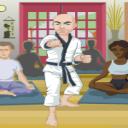Yahoo Answers is shutting down on May 4th, 2021 (Eastern Time) and beginning April 20th, 2021 (Eastern Time) the Yahoo Answers website will be in read-only mode. There will be no changes to other Yahoo properties or services, or your Yahoo account. You can find more information about the Yahoo Answers shutdown and how to download your data on this help page.
Trending News
Kata, more specifically, the bunkai, would it be relevant in the sport of MMA?
First off, I'm a traditional martial artist with a background in many styles. I do like kata, but I want to see what others think.
A lot of traditionalists have shied away from cage fighting, but more and more of the "big chain" style training centers that used to stay away are now offering MMA and grappling classes.
I really wanted to test myself and see if 20 years of training in tae kwon do, goju, kenpo and kung fu would be useless against a 2 year MMA student/pro mma fighter, so 2 years ago, I did, for an entire summer, then again the following summer.
I found out that I could easily beat all but the most experienced students, most of which had trained well over 2 years. That being said, I learned ALOT, and I urge all traditionalists to try it if you are still young enough to spar and if you willing for "your glass to be half empty".
Can you give an example of where a kata can directly help in the cage? (I know that kata training can indirectly help in a lot of ways)
Is kata still practical, or has MMA changed the landscape enough to disregard kata for fighting?
James
I am loving all the answers...thank you all for the time you are putting into these answers. Especially JW Bulldog...
@ the person who mentioned "2 years vs 20 years".....I have heard many stories about Brazilian Jiujitsu students with 2 years of training submitting established black belts on a regular basis. So I really wanted to put it to the test and find out for myself. Obviously it varies by individual.
I do think that MMA training is "as real as it gets" when considering safety during training.
Also, the concept of "one hit, one kill" is just not realistic. Possible, yes, likely to happen, no. Guys are not just going to go down and stay down from a single strike 99.9% of the time.
More to add later after we get more answers..
12 Answers
- jwbulldogsLv 71 decade agoFavorite Answer
Yes it can, but that is not the purpose of bunkai. MMA is built for sport as you well know. Bunkai is design specifically for self defense. There would be many thing in your bunkai that can be applicable for sport but even more of what is learned is designed to end the threat. It is not meant to make them tap. You have a different mind set.
As a martial artist I do not consider myself a fighter. A fighter fights. This fight could possibly last for a little while. It involves trading strikes. As a martial artist it would be goal is not to fight. I don't have to trade strikes, kicks, etc with anyone. My goal is to end the threat by any means necessary. I don't have a need or desire to prove my skill or abilities are superior to anyone. You can be superior, I don't mind. But if called for and I must defend myself I will be able to walk away and my attacker won't have that option. If that means using my glock, I will. If that means using my keys, I will. If that means diabling your arm, leg or any other joint, again I will. If that mean someone might lose their life I am not opposed to that as long I my life and my loved ones lives are preserved.
Source(s): Martial Arts since 1982 Black Belt in Shorin Ryu Black Belt in Jujitsu Brown Belt in Judo - idaiLv 51 decade ago
Hi there
All the techniques that apply to the kata or the bunkai are all applicable. But applying them in the bunkai sense will be a complete waste of time in any sports sense of fighting. The only way techniques from the kata can be used in sports fighting is if they are stripped out of the forms and practiced in a pratical way. No kata was ever ment to consist of 64 moves in a practical sense. History has made this so by making the arts more gentlemanly but by doing so nearly all of the spirit and feeling of the techniques have been lost. If you take out the techniques and practice them in small combinations by changing the angle and the timing of your attackers and their techniques then your taking the forms back to what they were originally intended to teach which is the principles. Strip one technique out and train around the principles it teaches. Applying constant variables by the attacker is the only realistic way to train. Some people call this henka or slight changes from the original. Form teachs form not fighting. Principles and applying them or having the ability to see the opening by having a feeling for what you are doing is what makes them work in any situation. Forcing A to fit B will just get you killed no matter how many times you have practiced it. On the other hand hitting a bag with bruit force will teach you f&^K all! As will using all your strength to wrestle and hold someone to the ground. If you want to use strength then you might as well join a gym and not a martial arts class. As you have rightly said you have to find the balance between the two. I dont mean this in a sports vs budo way i mean a realistic way of thinking, application and attitude as to how you train or why you train? If your mental mind set is not about fighting but you like the kata then you are simply not a fighter. If all you want to do is fight and grapple but arent interested in mastering the techniques then your not a martial artist!
Best wishes
idai
- callsignfuzzyLv 71 decade ago
Striking, throwing, locking, and choking are legal in MMA. If the bunkai includes training in these things, then they would have some applicability. Bunkai, however, is just analysis and drilling; you still have to spar using the techniques to get maximum benefit.
I also don't believe that one would have to learn or practice the solo kata. But then, it would no longer by bunkai (analysis), it would simply be a series of drills.
Also, some of the applications include techniques not legal for MMA, such as hair grabbing and locking the fingers. If one was training for MMA, these should be left out.
I'm a tremendous proponent of MMA-oriented training because of the "alive" pressure-testing and drills, and because of the "use/adapt what works" doctrine that's emphasized over a more dogmatic approach. With that said, I see kata and bunkai as having more of a pure self-defense application, which includes things you wouldn't find in most MMA classes. Though it's highly beneficial in the area of self-defense, MMA training is taught as a medium for competition 99% of the time. So-called "dirty" tactics, like those found in kata, have a place in self-defense, but no place in competition.
Finally, I commend you on getting out on the mats.
- Darth ScandalousLv 71 decade ago
Well, anytime you exchange hands with an adversary or opponent, you are applying Bunkai.
And I always say that all the techniques that are being used in MMA are from one form of Classical Martial Art or another. I have watched MMA matches and pointed out these techniques as they are being used.
I was also watching a Rorion Gracie Instructional video and was also able to point out what art and even the kata I have seen the techniques in.
I have been thinking of finding a young student who has never set foot in a MA school of any kind, and train him for the Arena using Koryu methods. I know a kid who would be great but he does not live in my city and is a bit young.
If I can see techniques in kata being used in MMA matches then it is absolutely helpful in the Arena... I hate the use of the word "cage" to describe it. Too animalistic, savage.
- How do you think about the answers? You can sign in to vote the answer.
- pugpaws2Lv 71 decade ago
Kata bunkai is mostly for self-defense situations and is often more suited for self-defense than any kind of competition.
The schools you mention now offering mma are doing so to get new students. They are worried about following the new trends and making money. Or they are worried about going out of business and are adding mma to try to stay in business. The economy is bad. People are doing all kinds of things to stay in business.
Using traditional martial arts in an mma competition is like going into a fight with your hands tied together. Some of your traditional training is not allowed. Why would anyone want to go into a fight without all their abilities?
Kata is still very relevant, but not in a mma competition. Kata bunkai was developed for life threatening situations. It was meant to stop or kill an attacker that is trying to kill you. Trying to use traditional bunkai in a competition is like pretending to shoot someone that attacks you by pointing a finger at them and yelling "Bang". MMA teaches the skills as they are used in the ring. Martial arts does not. It teaches brutal self-defense. Anyone that can;t see the difference is likely to get stomped in the ring.
You simply can't compare apples and oranges. The whole question reminds me of the question a few days ago asking who would win if you put a kick boxer in the ring with a karate-Ka, with both wearing boxing gloves. might as well tie the karate-ka's hands together.
Traditional martial arts and mma are not comparable on a level playing field. Yet everyone keeps wanting to test them against each other. to me it is silly. both are effective for what they were designed for, assuming that the training is done correctly. But you can't say if a cat or a dog is superior. They are not the same thing. nothing you can do will make them the same.
EDIT:
You said, "I do think that MMA training is "as real as it gets" when considering safety during training."
As real as it gets is still not real....... The only thing that is realistic is all out fighting, with no rules, and no warning that the fight is going to happen. Even with no rules, if you know before that it is coming, it makes it un-realistic.
You also said....
"Also, the concept of "one hit, one kill" is just not realistic. Possible, yes, likely to happen, no. Guys are not just going to go down and stay down from a single strike 99.9% of the time."
I never took that as literally as in your post. I have never believed that one strike one kill was practical. While it is possible, it is unlikely. Anyone that trains thinking that they can kill with one strike anytime when needed is risking getting themselves massed up. On the other hand a real fight does not take several minutes, or several rounds to end. most are over rather quickly.
...
Source(s): Martial arts training and research since 1967. Teaching martial arts since 1973. - Shiro KumaLv 61 decade ago
Classical kata and bunkai were developed - and is practiced - under a completely different mindset than what comprises a typical MMA match. Most, if not all, classical kata will assume or at least accommodate for multiple attackers or attacks from various angles, steps to disengage from a fight and create distance, the presence and use of weapons, etc. Also, kata does not take into account the presence of rule sets as required by formal competition, and - especially in Japanese arts - highly prefer the "one strike, one life" approach; or at least "one strike and then get away" route.
Put simply: competition, including in MMA, is completely different from what a classical kata (and bunkai) is meant to prepare you for.
Do I think that kata is still practical for "fighting"? Yes, I do. MMA competition, on the other hand, is pretty much a specialized venue - far different from a "fight" as understood from a classical martial art point of view. The dynamics of an MMA match, the initial conditions of it, how it's started, the possible ways it can end, etc. is completely different from what was envisioned when the classical martial arts and their kata were formalized.
So, I don't see how traditional kata and bunkai can have any direct benefit for MMA competitors.
EDIT:
Yes, the "one hit, one life" concept is probably more applicable to arts like kenjutsu. Still, most classical arts I'm aware of will stress the need to decisively end a confrontation as quickly as possible, and in a position ready to face any subsequent attacker.
Anyway, again, IMO, what ke now call MMA has become a very distinctive sport, and to excel in it, the most practical routes are training methods specifically designed for it. So, the classical concept and practice of bunkai can be beneficial, but only in the long term, and then indirectly.
Lastly, like pugpaws pointed out, MMA's "as real as it gets" is a far cry from reality. There are constants in place: participants are always aware that they will face only one unarmed person who will most likely fight within the rules, and that there are people working to ensure their safety. You don't have these kind of luxuries in a "real" situation.
- SiFu frankLv 61 decade ago
Keith Mazza settled this in Atlantic City New Jersey Last year when he handily defeated two MMA fighters in two separate matches. I know Master Mazza does his forms daily.
Also in AARP magazine this months issue and article on a 70 year old martial artiest defeated a champion MMA fighter in a sanctioned match in Las Vegas was posted.
I don't believe the physiology of the human body has changed that much in a couple hundred years to make Kata or Bunkai a thing of the past.
Source(s): life - ISDSLv 61 decade ago
20 years vs. 2 years. Did you expect it to be any different than it was?
The interesting experiment would have been to spar MMA fighters who have 20 years of cumulative training, whether it all be in MMA or split between MMA and a former style (wrestling, boxing, etc.)
- KokoroLv 71 decade ago
the simple answer is yes.
but it more depends upon your understanding of kata and bunkai. all the moves and techniques are in kata that you need. in the kata you find the techniques they use in mma including the reversal for the grappling techniques. as well as ground fighting.
Source(s): 30+yrs ma - 1 decade ago
kata's have helped me in multiple training situations. i did okinawan kenpo for 6 years beofre going to MMA. Kata's have taught me how to balance myself in awkward situations and how to counter and get out of holds, either in standup or on the ground








